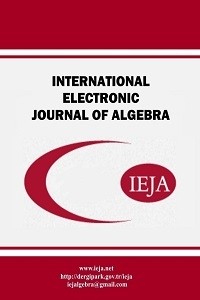SOME PROPERTIES OF THE REPRESENTATION CATEGORY OF TWISTED DRINFELD DOUBLES OF FINITE GROUPS
A criterion for a simple object of the representation category
$\Rep(D^\omega(G))$ of the twisted Drinfeld double $D^\omega(G)$
to be a generator is given, where $G$ is a finite group and $\omega$ is
a 3-cocycle on $G$. A description of the adjoint category of
$\Rep(D^\omega(G))$ is also given.
Keywords:
Drinfeld double, quantum double $~$,
___
- B. Bakalov and A. Kirillov Jr., Lectures on Tensor Categories and Modular Functors, University Lecture Series, 21, American Mathematical Society, Providence, RI, 2001.
- A. Coste, T. Gannon and P. Ruelle, Finite group modular data, Nuclear Phys. B, 581(3) (2000), 679-717.
- R. Dijkgraaf, V. Pasquier and P. Roche, Quasi-quantum groups related to orbifold models, Modern quantum field theory (Bombay, 1990), World Sci. Publ., River Edge, NJ, (1991), 375-383.
- R. Dijkgraaf, V. Pasquier and P. Roche, Quasi-Hopf algebras, group cohomology, and orbifold models, Integrable systems and quantum groups (Pavia, 1990), World Sci. Publ., River Edge, NJ, (1992), 75-98.
- L. Dornho, Group Representation Theory, Part A, M. Dekker (1971).
- P. Etingof, D. Nikshych and V. Ostrik, On fusion categories, Ann. of Math. (2), 162 (2005), 581-642.
- S. Gelaki and D. Nikshych, Nilpotent fusion categories, Adv. Math., 217 (2008), 1053-1071.
- J. E. Humphreys, Representation of SL(2; p), Amer. Math. Monthly, 82 (1975), no. 1, 21-39.
- H. Jordan, Group characters of various types of linear groups, Amer. J. Math., 29 (1907), 387-405.
- M. Muger, On the structure of modular categories, Proc. London Math. Soc., 87(2) (2003), 291-308.
- D. Naidu and D. Nikshych, Lagrangian subcategories and braided tensor equivalences of twisted quantum doubles of finite groups, Comm. Math. Phys., 279 (2008), 845-872.
- D. Naidu, D. Nikshych and S. Witherspoon, Fusion subcategories of representation categories of twisted quantum doubles of finite groups, Int. Math. Res. Not. IMRN, 22 (2009), 4183-4219.
- I. Schur, Untersuchungen uber die Darstellungen der endlichen Gruppen durch gebrochene lineare Substitutionen, J. Reine Angew. Math., 132 (1907) 85-137.
- ISSN: 1306-6048
- Yayın Aralığı: Yılda 2 Sayı
- Başlangıç: 2007
- Yayıncı: Abdullah HARMANCI
